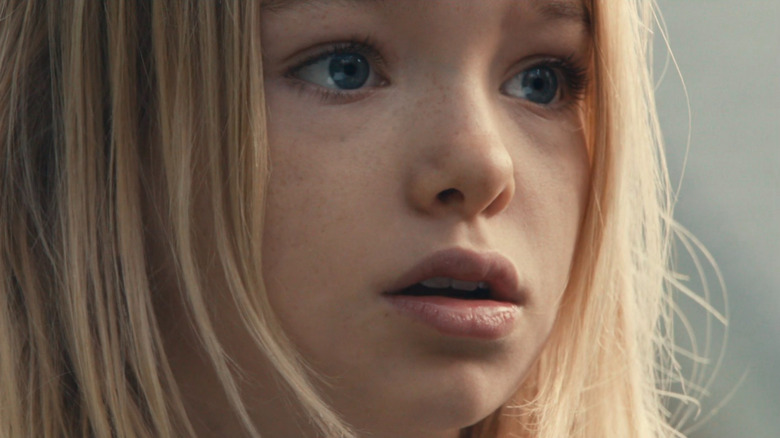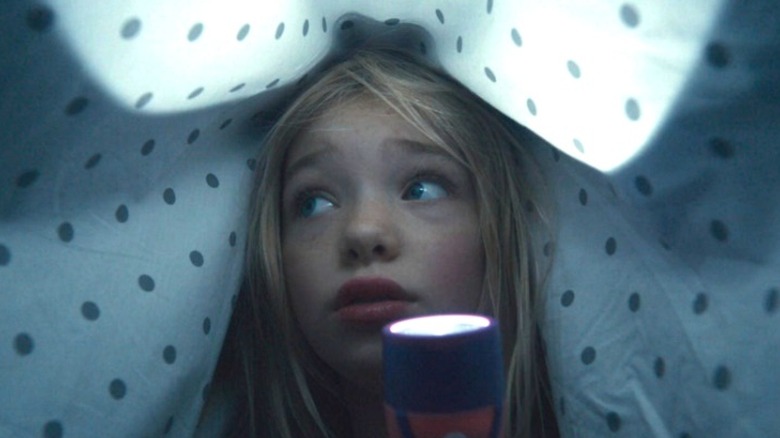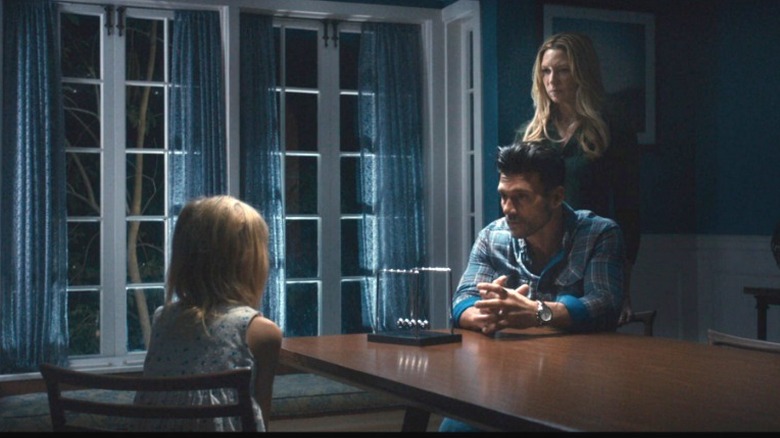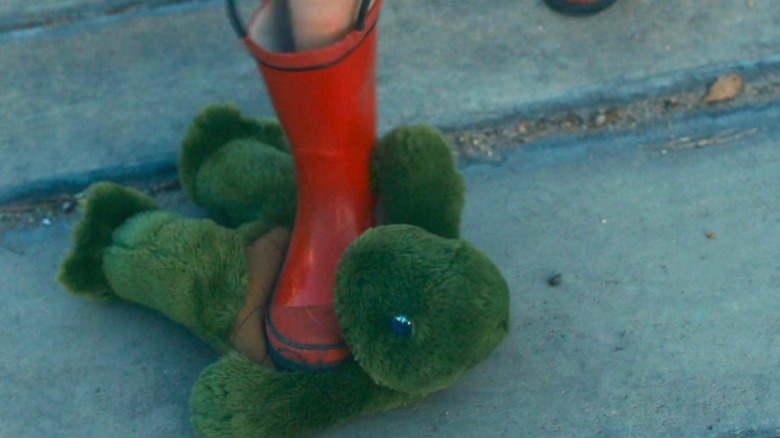The Ending Of Stephanie Explained
Horror movies centering on child protagonists always make for an especially frightful time, as our sympathies as audience members are so easily swayed. However, Blumhouse Productions chose to take the concept in a different direction with the 2017 horror film "Stephanie." Starring Shree Crooks ("Captain Fantastic," "The Glass Castle," "American Horror Story"), Frank Grillo, and Anna Torv, the direct-to-video feature tells the story of a young girl (Crooks) who is abandoned in her parent's house following a mysterious apocalyptic event. Her parents (Grillo and Torv) eventually return, only for a serious threat to loom over the family that no one sees coming.
The film, directed by Akiva Goldsman (who also produced 2022's similarly-themed "Firestarter") film isn't the most loved, with only a 33% Tomatometer score and a 40% audience score on Rotten Tomatoes. Roger Moore from Movie Nation says in their review, "'Stephanie' simply toddles along, intriguing for 20 minutes, exciting for three or four, and dull the remaining 60 minutes of its tedious, been-there/saw-that-coming running time."
That all may be a bit harsh, as the film, while not perfect, does put a lot of effort in bringing a new take to this kind of horror setup. Its eventual plot twist might catch newcomers by surprise and those who have seen the film are left with a lot to think about by its conclusion. So let's take a deeper dive into what "Stephanie" has to offer, and examine its shocking ending.
Something in the shadows
The world of "Stephanie" occurs in an unknown future, where a mysterious worldwide catastrophe has thrown Earth into chaos. The film first sees Stephanie living all on her own at the abandoned home of her parents. Here, she goes about her life, eating copious amounts of junk food, watching cartoons, and playing with her stuffed animals. Even in the crumbling world around her, she is still able to preserve her childhood and makes the best out her situation. The only slightly off-putting thing about her is that the corpse of her brother, Paul, lays in one of the top rooms of the house and she interacts with it regularly. Similarly, she begins to notice a strange, dark entity following her around that she becomes fearful of and only sees in dreams.
The first chunk of the film juxtaposes itself in a nice way. We can both see how Stephanie is, at heart, a normal child who just wants to lead a normal life. Yet, we can also tell that something about her situation is definitely bizarre, to say the least. If anything, her seeming obliviousness to her surroundings feels far past simple childhood naivety. Could it be the shadowy figure in her dreams that's warping her reality? As you can imagine, the film doesn't give any handouts this early on. Nevertheless, it lays the groundwork for our experience moving forward.
The beast within
Stephanie's parents return out of the blue one night, much to her delight. The family attempts to restart life, doing their best to comfort and apologize for their absence. However, like their daughter, something about the parents seems to be off. The father, Eric (Grillo), carries a gun on him, while the mother, Jane (Torv), has deep puncture wounds along her back and seems more untrusting. They also remain mostly quiet about the reason for their disappearance. That is until they question Stephanie about what happened the day they left. It turns out, after Paul made fun of Stephanie while they were carving pumpkins, the young girl used telekinetic powers to kill him. She proceeded to then injure her mother, which is how Jane got her back wounds.
From there, we learn that the strange figure menacing Stephanie was only what they believe to be a hallucination. The entire time, Stephanie was the actual monster. This section sees the film further play with its clashing elements, with the twist only complicating matters for our characters and the audience. Up until this point, we — much like Stephanie's parents — have tried as hard as possible to sympathize with and love Stephanie. But now, the darker, bizarre elements that were hinted at before make themselves ever more present. It shows that the monster we need to fear can be within ourselves, and we see what can happen when we let that fear consume us.
Childhood no more
We learn that an otherworldly force has taken over not only Stephanie, but countless children across the world to cause destruction. Her parents try performing brain surgery to nullify her abilities. But the telekinetic powers of the being in control takes control, even though she is unconscious, and stops the operation.
Stephanie, unaware of the events of the last few days, acts like a normal child again. The parents then learn that officials are saying that the only way to stop any infected children is to kill them. With a heavy heart, they poison Stephanie's drink. But once again, the entity possessing her stops her, and Eric is forced to shoot her. It's only a short-lived victory. Stephanie returns and murder her parents.
She leaves the house and destroys the others, a tentacled shadow following her. As she leaves, she drops the stuffed turtle toy that she had been holding throughout the film, signifying that now, her transition is complete. Rather than fighting it any longer, she fully sheds her childhood, becoming one with whatever has taken over her mind. We never fully learn what is doing this or its intention. Rather, we are left with the film's ambiguous yet horrifying reality that this world's children no longer have a childhood. They are slaves to an all-seeing, mysterious power that controls their every move.
Is it symbolic for the rapid growth of youth today that sees them gain information so fast that their childhood is lost sooner? The ending leaves itself open to interpretation, all we know for sure is that "Stephanie" holds nothing back in delivering a chilling supernatural venture.



